
There is an online course for just about everything today. Whether you are trying to learn mathematics or learn how to be better at tennis, courses exist online. And to make those courses in WordPress, you need LMS plugins.
The popularity of course websites has skyrocketed in recent years, especially during the pandemic. Online video courses in general have really risen in popularity, and sites built around them have become very profitable.
Of course, building these types of websites is not easy. Even if you buy the right kind of tools, the truth is you need experts to craft the content. As a result, there’s a tremendous amount of prep work that goes into every site.
Today, I am going to share the most popular LMS plugins you can use to build your own online courses.
What Are LMS Plugins in WordPress?
An LMS, or Learning Management System, in WordPress, is software that allows you to build online courses. It handles everything from creating courses, creating coursework (homework, quizzes, tests, etc.), accepting payments, and much more.
Many LMS plugins focus on a specific type of course structure or class. For instance, imagine an online course about World War 2 and another for Graphic Design. These topics are quite different and the course structures are not going to be similar to one another.
You’ll need unique submission options for the graphic design courses (like being able to accept the correct file types) and much more.
In other cases, sometimes the online courses are only part of the course as a whole. For instance, you might take a course on how to improve your tennis swing. While the course may provide info online, you probably will have an in-person session as well.
That’s going to need a variety of different tools to set up and some LMS are better equipped for it than a fully online experience.
What To Look For In LMS Plugins
As we just touched on, what you are looking for in an LMS is going to be different from another site. That said, there are still going to be a lot of features that overlap in terms of importance.
Let’s take a moment to go over what you should be on the lookout for when choosing an eLearning plugin for WordPress.
Course Enrollment
The courses you build are meaningless if you do not have students attending them. Thus, every competent LMS comes with enrollment tools that allow you to grant students access to the courses, and most importantly, collect payments.
Most LMSs have a great selection of subscription plans you can create to fit the needs of your business.
Collecting payments is also a vital part of the enrollment process. You’ll need to be able to connect with popular payment gateways (PayPal, Stripe, etc.) to make sure your business is accessible to all clientele.
The worst thing that can happen is losing a customer because they don’t have a way to pay you.
Course Building
The bread and butter of every LMS is the actual course building. This includes things like the video player, the material you ask visitors to read, and much more.
Essentially, every aspect of the course itself is dependent on the options you have when building a course from scratch. Many LMSs come with templates you can follow and customize to fit your needs.
Today, most of the popular LMSs have adopted a drag-and-drop course builder. This means you can choose the elements you want to include (image, video, etc.) and drag them to the desired location.
This makes it easy to build courses from scratch and you can see what they look like in real time.
Course Evaluations
Love them or hate them, quizzes and tests are an essential part of gauging how effective students are at absorbing the material you are trying to teach them.
Most LMS plugins offer a variety of options like multiple choice, fill-in-the-blank, short answer, essay options, and much more. Some formats work better for certain subjects, so it is important to have those options available.
Of course, evaluating the student’s performance is really only half of the battle. You also need access to powerful analytics that can help you identify what courses are the most popular.
This can help you create more courses that students may be willing to take, or even develop more advanced courses for those that completed the first course.
Course Progress
Students need to be able to see their progress within a course. This can be in the form of grades, certificates, progress bars, and more. Many LMS today use Gamification to help make it seem like students are making lots of progress. Basically, by completing coursework (tasks), students will earn badges (rewards). It helps motivate and keep the students engaged.
Some of the LMS plugins on this list really go the extra mile when it comes to adding incentives. This is known as gamification and comes in many forms.
The most popular are rewarding badges and creating a points system that encourages students to increase their scores. These types of systems help drive students through course material, so don’t hesitate to add them.
Content Dripping
The courses you build are the content you provide to your users. And due to the amount of time it takes to build courses, you probably want to make sure that a course lasts a certain amount of time. For that reason, content dripping is an essential part of the equation.
Content dripping helps limit how much content a student can go through in a day, which can help increase the length of their subscription.
Most competent LMS tools allow you to schedule when the coursework will be available. For example, you would be able to release content on a weekly basis so students have new course material to work on weekly.
This helps keep the students enrolled for longer periods of time when compared to giving them access to the full course all at once.
Student Communication/Collaboration
Depending on the type of course, you may want students to interact with one another. For that to happen, you must have a communication system in place.
Although many students may just agree to use another platform to collaborate, like Discord or Google Docs, it’s important for an LMS to include communication or collaboration features.
Many LMS plugins have a ton of integration options when it comes to collaboration with the most popular option being Zoom. In fact, you can host entire classes on Zoom.
Alternatively, some of these include live stream options to allow you to deliver lectures on a more personal level instead of pre-recording them. It’s a great way for students to ask questions and boost engagement.
Cost
At the end of the day, regardless of your intentions, your website is a business. You need to make sure that the cost of your LMS falls within an acceptable range.
The good news is that you can find an excellent WordPress LMS plugin for free. That said, these typically lack other features we have mentioned, thus, the premium version is usually the better option for businesses.
With all of that said, let’s take a look at the best LMS plugins available in WordPress.
1. MemberPress

MemberPress is one of the best membership plugins in WordPress, and while it can be used for any type of membership website, it excels at online courses. This is all thanks to the course builder it includes.
This is known as Class Room mode and gives you a head start for building online courses in WordPress.
One of the biggest obstacles beginners face is trying to get their courses to actually look good in an online environment. The Classroom Mode provides an easy-to-navigate course system that looks great.
Figuring out what course material to do next is simple and you can lock certain tasks until the previous one is completed. This prevents students from hopping to modules the course has not covered yet.
Of course, that’s not to say you are limited to the default design. You can customize it using custom CSS. The courses themselves are built right in Gutenberg, so it’s a very intuitive process for both students and course creators.
Benefits of Using MemberPress
- Create multiple subscription plans that grant access to different content and work for different lengths of time
- Content dripping allows you to reveal new coursework at designated times (once a day, week, month, etc.)
- Has a variety of useful integration like Zoom to help with communication
- Fully compatible with Google Analytics
- Analytics help you identify areas your students may be getting stuck
2. Tutor LMS
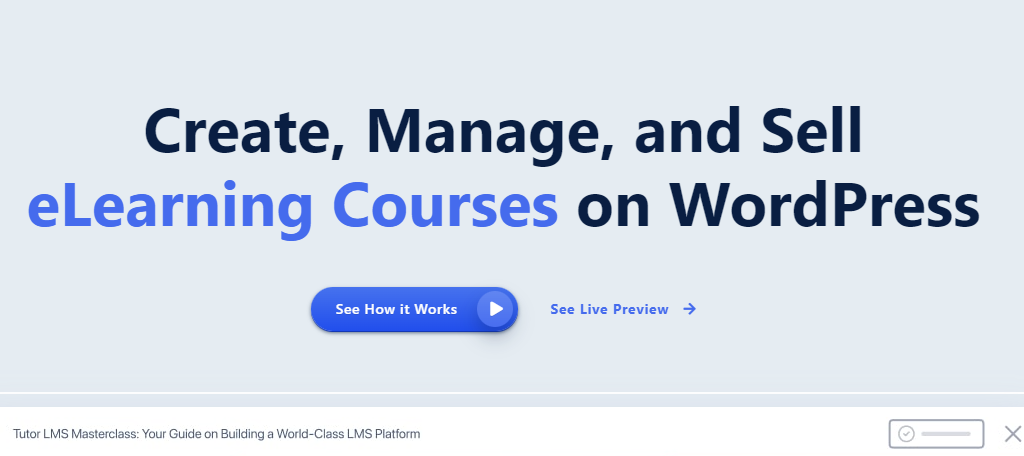
Tutor LMS is one of the newest plugins on this list, but don’t let that trick you into underestimating it. The truth is that this plugin is simply one of the best on the platform and excels at building online courses.
But don’t just take my word for it; you can actually try the plugin for free with the free version.
So what makes this plugin so special? Well, if I had to pick a single feature it would definitely be the drag-and-drop course builder. The course builder is easy to use yet still provides users with a robust selection of options to choose from.
This plugin also has the ability to host live classes online. You’ll have multiple chat options to use including Zoom, YouTube, or Google Classroom. It’s also extremely useful if you need to provide extra support to a student one-on-one.
Sometimes the most annoying aspect of an LMS is not being able to quickly access what you want from the dashboard. That’s not an issue here because you can customize what is in your dashboard as both a teacher and a student.
Benefits of Using Tutor LMS
- Students can access all of their courses on a mobile device
- Powerful analytics allow you to track student performance and earnings in one place
- Includes a variety of email templates with excellent design
- Supports over 27 different languages which makes it great for foreign language classes
- Easily include a file submission option on all assignments
3. LearnDash

Do you know what many eLearning websites and universities have in common? They both use LearnDash to create online courses. That’s right, you could use the exact same software a university uses and get the same results.
While there is no free trial, you can try without consequence, as you can get a refund if you cancel within the first thirty days.
In terms of course creation, you’ll be able to build courses using a drag-and-drop course builder. With it, you can build anything from the lesson to the final exam within the same editor. It’s comprehensive but easy to use.
One of the biggest hurdles when installing LMS plugins in WordPress is how difficult they can be to set up. Learndash fixes this with the best setup wizard on this list. You’ll be able to set up the essentials in minutes and then focus on expanding each one.
Communication between students is incredibly important. One way that LearnDash stands out is to have dynamic forums built into the software. This creates a great environment for students to discuss topics with one another.
Benefits of Using LearnDash
- Create multi-tiered courses aimed at beginner, intermediate, or advanced learners
- Drip content at regular intervals to make sure students have new lessons to go through without feeling overwhelmed
- Send out automatic emails when an assignment is ready to be graded or when an assignment has been graded
- Award students certificates and badges as they progress through the course (gamification)
- Works well in a multi-site environment, but requires a different plan
4. LifterLMS

LifterLMS is another powerful online course builder that delivers an excellent user experience for both students and teachers. It includes all of the essential features an LMS needs to function in WordPress alongside its own unique features.
You can get started for just $1 for the first thirty days, so there’s not much to lose in giving it a try.
As is the standard for LMS, LifterLMS sports a drag-and-drop builder that allows you to build courses easily and add lots of elements. One of the biggest focuses with this one is how easy it is to place multimedia (images, videos, audio, etc.) into the courses.
You can easily set up multi-tiered courses where users have to complete course A before they can take course B. This ensures the student has the knowledge they need to properly understand the course material, while also increasing the number of courses they take.
One of the more unique features is after a student completes a course, they are asked to leave a review/testimonial. You can use these to help promote your courses to other students.
Never underestimate the power of user reviews.
Benefits of Using Lifter LMS
- Includes a great selection of add-ons like an affiliate manager to help improve affiliate interactions
- Add gamification to all assignments to help push students through coursework
- Analytics help track down where students struggle the most
- Drip content on a regular schedule to ensure students always have new assignments on a weekly basis
- Integrates with eCommerce platforms to help you accept payments from a variety of sources
5. LearnPress
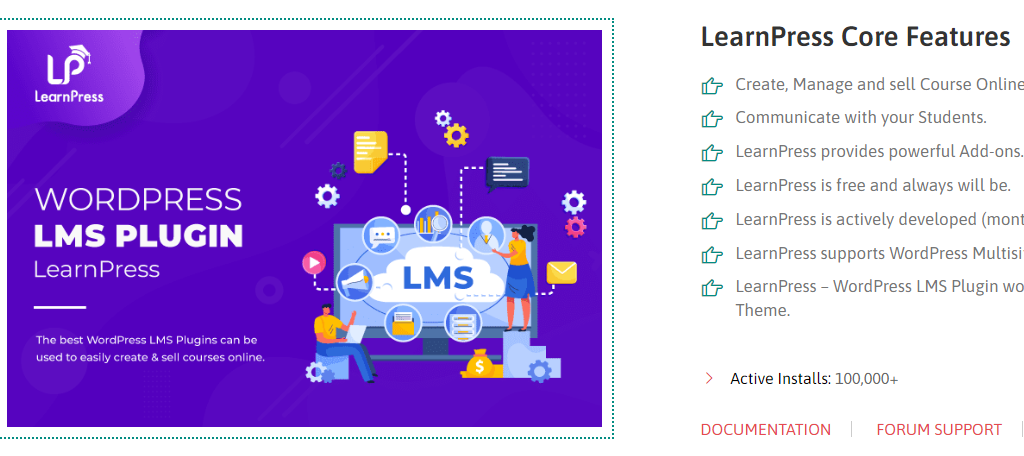
Are you looking for a free plugin to build a course in WordPress? If so, look no further than the wildly popular LearnPress plugin. This plugin is completely free and includes a variety of features that you can use to make excellent online courses.
Of course, as a free option, it will ultimately have fewer features than a premium option. However, it may just be what you are looking for.
One area that this plugin matches its premium counterparts is the course builder. It includes an easy-to-use drag-and-drop course builder that gives you complete freedom when it comes to course creation.
This plugin comes with a full gamification tool set. It allows you to assign points and badges to every activity. This allows students to increase their scores and collect rewards as they go through the course material.
Now while the plugin is free, it’s worth mentioning that if you want to accept payments, you are going to need to pay for payment gateway integration. The good news is that this is just a one-time fee, but it is something you should be aware of.
Benefits of Using LearnPress
- Includes the ability to place images, videos, audio, PowerPoint presentations, and much more into any lesson
- Drip content to your students to ensure they stay engaged with the course material
- Integrates with WooCommerce to help make it easier to accept payments
- Purchase the Prerequisite add-on to make it so students need to take one course before taking another
- There is no limit on the number of courses or lesson materials you can build
6. WP Courseware
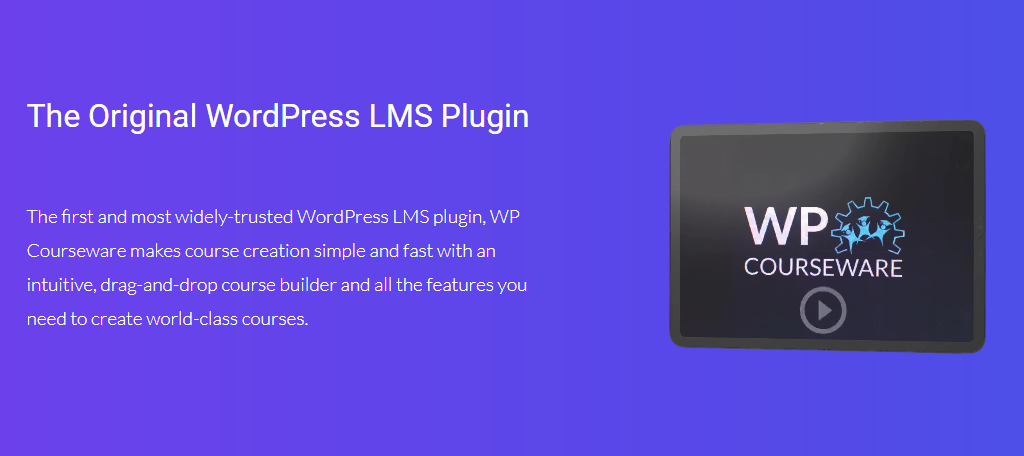
One of the best LMS plugins you can find on WordPress is WP Courseware. It comes with everything you will need to build your online courses and ensure they are a huge hit with the students that take them.
You can try it for free by using WP Courseware’s demo site. It’s a great way to see if it’s right for you before buying it.
As you might expect by this point, WP Coursework comes with a drag-and-drop course builder. It is perfect for building courses of any size and as soon as you finish them, it will automatically list them for your site.
One of the more unique features that many online course developers may think is useless is the offline options. That’s right, if students can’t always be online, they can actually print out the lessons using the PDF version of them.
Obviously, they will still need to be online to submit coursework, but it can be great for students with bad internet connections. Regardless of if you are a student or teacher, you’ll have a great experience with WP Courseware.
Benefits of Using WP Courseware
- Utilizes a content drip feature that allows you to release coursework on specific dates
- Choose between PayPal and Stripe to accept one-time payments or even recurring payments
- Create course prerequisites to ensure students are ready for what they sign up for
- Instructors do not need backend access to create or edit their courses
- Place courses anywhere on your website using shortcodes
7. Sensei

Do you know what WordPress, WooCommerce, Jetpack, and Sensei all have in common? They were all made by Automattic. As you might expect, Sensei is another terrific plugin that allows you to easily build courses in WordPress.
You’ll be able to try the full plugin by visiting the demo website.
Unlike many on this list, Sensei does not have a drag-and-drop editor. Instead, it uses the WordPress editor to put courses together. The good news is that Gutenberg is pretty intuitive, so, if you can build your website in WordPress, you can build courses with this plugin.
As such, you won’t have any limitations when it comes to the content you can add to courses. Videos, images, audio files, PDFs, and just about anything else you can place in Gutenberg is free game.
As you might expect, you are going to need WooCommerce to sell your courses in WordPress. As these plugins come from the same developers, they work seamlessly together. Overall, the plugin is comprehensive and easy to use.
Benefits of Using Sensei
- Quizzes can be graded automatically so students can receive feedback immediately
- Encourage students to continue courses with gamification (badges)
- Includes an instant messenger for communication between students and instructors
- Accept recurring payments for subscriptions or one-time payments
- Create random quizzes from a bank of questions you have already made
8. MasterStudy LMS
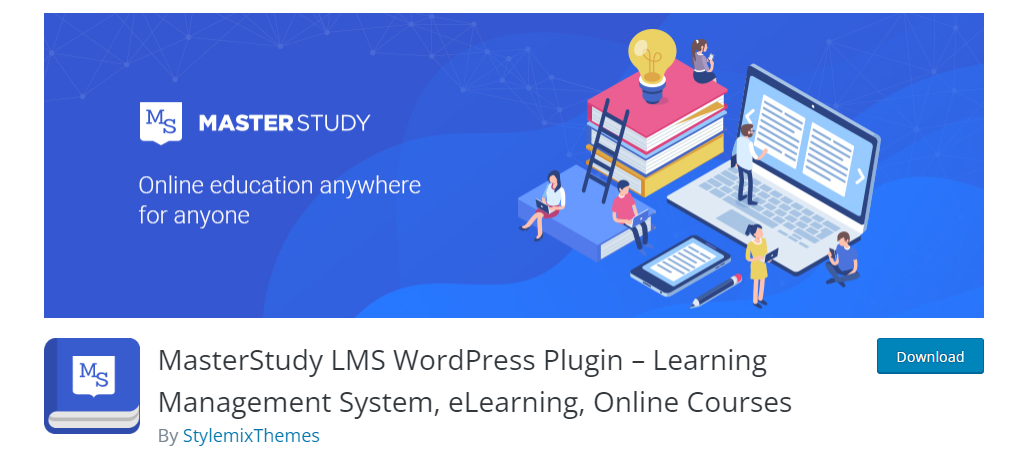
If you are trying to build courses on a budget, the MasterStudy LMS is the perfect plugin for the job. It is completely free to use and has everything you’ll need to create high-quality courses your students will love.
It’s perfect for just about any kind of course including one-on-one classes (coaching), or traditional university-styled courses.
The MasterStudy course builder is comprehensive, but a bit more complicated than the standard drag-and-drop options. That said, it’s still pretty easy to use. You simply select what you want to build and fill out the necessary information.
You’ll also be able to post video lessons and even live stream the course material directly for students. With that said, there are fewer design options available, but that is to be expected of any free option.
Of course, there is a Pro version that includes a lot of the bells and whistles you’ll find in the other LMS tools on this list. One of the more unique features is the ability to design your own course certificates to award students who pass.
Benefits of Using MasterStudy
- The Pro version includes Zoom integration so you can create an online classroom
- Give students the ability to retake quizzes to get the results they want
- Display how long a lesson will take to complete to help students set aside enough time
- Import options for courses made on Udemy
- Create a free trial course to show potential students what your courses are like
9. Good LMS
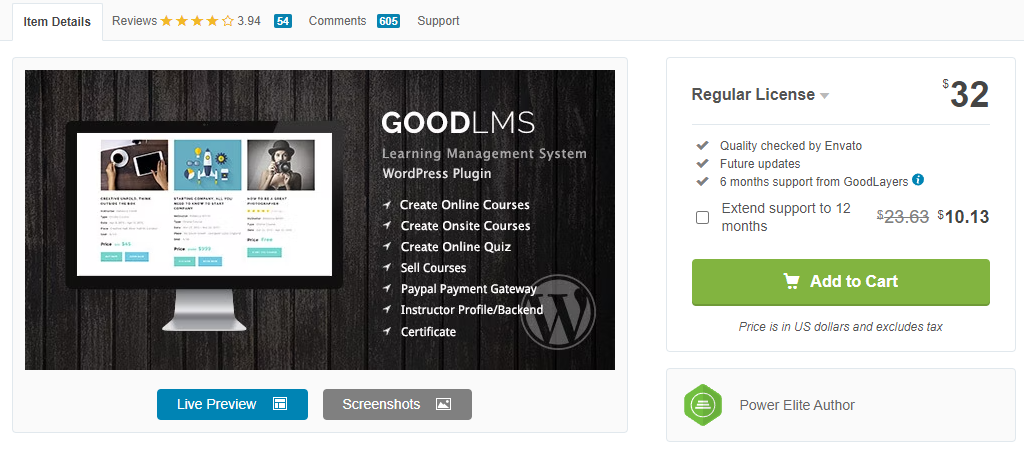
While it’s not free, Good LMS is one of the cheapest LMS plugins on this list at just $32. And you’ll be pleased to know that it includes everything you’ll need to launch successful courses in WordPress.
What’s even more important is that it’s easy to use. They even have a great tutorial video to show you how everything works.
So how does building courses work? You’ll be able to put a course together by making a choice of what elements to include and filling out the appropriate information.
Building assignments, quizzes, and tests is an identical process.
Courses look professional from the student’s side of things. There’s a really nice progress bar when going through courses so you can see what you’ve covered and what’s to come. This also helps make navigating through the lesson much easier.
One of the more unique features is being able to set a commission rate. That way instructors looking to create courses for you know what they are going to make. It’s a great way to get instructors flocking to your website.
Benefits of Using Good LMS
- Includes a coupon creator to create coupons for your courses and get new students to sign up
- The Interface of the plugin is based on WordPress, so you’ll know how to use it if you know WordPress
- Gamification is front and center with both a badge and point system to help push students along
- Create custom certificates for your students that pass the courses you build
- Allows students to retake quizzes as many times as they want
10. Paid Memberships Pro

Closing out our list of the best LMS plugins for WordPress is the amazing Paid Memberships Pro plugin. Don’t let its placement fool you, though. It is incredibly popular with over 100,000 active installs and has everything you need to build courses in WordPress.
That said, you will need to install the free add-on that adds course creation functionality.
One of the best aspects of this plugin is the integration options for other LMS plugins like LearnDash, Lifter, Sensei, and Tutor LMS. All of these are featured on the list and you can choose to use those course builders if you want by purchasing the integration option.
That said, You will be able to create courses without using another LMS. In this case, you can use the WordPress editor to do it, which means you can add just about anything to the courses you make.
The specialty of this plugin is managing enrolled students. You can track each member and ensure they have the access they need to take the course they sign up for. But for the most part, this will all be automated.
Benefits of Using Paid Memberships Pro
- There are no limits on the number or types of memberships you can create for your courses
- You can create a membership that grants access to all courses at once
- Many features in the plugin are controlled with shortcodes to make it easy to use
- Integrates with most plugins like WooCommerce, Elementor, MailChimp, and more
- Includes a variety of filter and action hooks you can utilize
FAQ
Picking an LMS plugin is really only the first step to building a course-based website. For that reason, you probably have a lot of questions concerning LMS. Here are some of the most common questions you may have.
Are Premium LMS Plugins Worth the Cost?
Absolutely!
While there are some excellent free options available, the truth is they often lack features you are going to need, especially when your website becomes more popular. And most notably, the design options and usability are much smoother on premium options.
Ultimately, that matters a lot when it comes to dealing with coursework online. I’m sure many people reading this have probably taken a course online, and if the user interface is bad, it can be a really poor experience.
The expectations for these types of sites are growing, and there’s no shortage of competition. That’s why having all of the bells and whistles is more important than ever. And premium LMS plugins have that in spades.
Is WordPress A Good Platform For LMS?
WordPress is an amazing platform for any type of website.
The platform offers developers a robust experience when it comes to designing websites. And you can take that to the next level by installing plugins to add necessary features and functionality.
It’s also worth noting that, unlike many other website-building platforms, WordPress is completely free.
This by itself can help lower the initial cost of building a website substantially. And due to its popularity, there’s an enormous amount of resources available for WordPress.
The only cost associated with it is your web hosting, but that is true for every single platform.
It is also worth pointing out how easy the platform is to use in general. Almost everything in WordPress can be done without writing a line of code. That said, the option exists for those that are inclined.
As this list has just demonstrated, there is no shortage of amazing LMS plugins to choose from. Overall, the WordPress platform is one of the best choices you can make regardless of what type of website you decide to build.
Will An LMS Plugin Be Enough On Its Own?
Probably not.
You might have noticed that I mentioned a lot of the above plugins offer users several plugin integration options. That’s because you may use a more specialized plugin to fit the needs of your website.
For example, email marketing is essential to every website no matter what it focuses on. Your course website is no different. You are going to want to send out emails that tell users about new courses, sales, and deals you may be offering, and much more.
For this reason, you would probably use a dedicated email plugin or service like MailChimp.
Another notable example would be building your home page. While many LMS features might have templates you can use, dedicated page builders can give you more creative freedom. Thus, you might consider using Elementor.
Odds are you are going to have a handful of plugins installed at any given time. Just make sure not to go overboard as installing too many can lead to performance issues on your website.
Is Gamification A Good Addition to eLearning Websites?
Many of these LMS plugins offer some kind of gamification option in one way or another. Is this worth including?
Short answer, yes. Long answer, keep reading.
One of the biggest problems students face when taking any kind of course is motivation. And this problem is far more pronounced in an online environment. Gamification can help improve student motivation by getting them to continue their lesson.
You see, a small reward like a badge, trophy, or some other virtual item, can actually be enough to drive people forward. And when people have something to look forward to, they typically do a better job.
Of course, the reward itself is only part of the magic. These rewards are usually accompanied by a neat little animation. This animation for successfully completing an activity adds to the learning experience.
Some people are very susceptible to this type of design, thus, they push forward to see it again. And even better for you, some users like to earn all of the rewards possible, which means they may want to take additional courses that offer more rewards.
Gamification has a proven track record and can significantly benefit any eLearning environment.
How Qualified Should Instructors Be?
It ultimately depends on the type of classes you are teaching, but to be clear, you don’t actually need any credentials.
For example, the credentials someone may need to teach you how to be a tennis star are quite different than someone teaching you web design. Thus, you need to make sure they are qualified in their respective field, and that can be tricky to determine.
In this example, you could get a degree from a college in web design. Yet, does that mean someone who has built a successful website shouldn’t also qualify? Of course not, as someone with real-world experience is just as valuable as an instructor.
On the flip side, what exactly qualifies someone to be a tennis coach? Is it winning tournaments? Is it playing the sport for many years? It really depends on what the clientele is looking for and that’s the most important aspect.
You just need to make sure that the students feel like they are getting the information from someone who acts as an authority on the subject matter. And those credentials can be a huge selling point for your courses.
How Do I Attract Students to My Courses?
Marketing, marketing, and a lot more marketing.
Some really big eLearning websites have popped up in recent years, and that’s really thanks to the marketing approach they take. For instance, if you watch a lot of YouTube, you’ve probably seen some SkillShare ads.
Now, obviously, it takes a sizable budget to purchase direct ads from YouTubers and other influencers. The good news is that there are about a hundred different things you can do to promote your business.
One of the first things you need to do is give people a taste of what your courses of like. The best way to do this is to offer a free or trial course. Most people won’t pay if they don’t know the quality of the lesson.
Building a social media presence is also very important. Running social media campaigns with existing students is a great way to help spread the word. If you offer physical lessons (sports, fitness, mechanics, etc.), advertise locally.
This could be as simple as putting up posters, handing out cards, or something else. Being creative can really do a lot for your business, so be sure to put a lot of effort into brainstorming ideas.
Start Building Online Courses Today With These Great LMS Plugins
As you can see, there is no shortage of amazing LMS plugins on WordPress. Each one has its own unique spin on the course creation process and users will certainly have their own preferences on what’s the best.
Once you have an LMS in place, you need to get qualified instructors that can teach courses online and know how to actually use the LMS to build those courses. And of course, once that’s done, you need to convince users your courses are worth paying for.
As you probably already know, building a website for online courses is very time intensive, so make sure to have the proper resources in place. This doesn’t just mean course material, but the money to keep your website online.
Otherwise, you might not last very long.
In any case, I hope you found this list to be helpful, and if we missed your favorite LMS plugins in WordPress, let us know in the comments section.
What’s your favorite LMS plugin? What type of courses are you hoping to build and sell online?
[ad_2]
Source link






